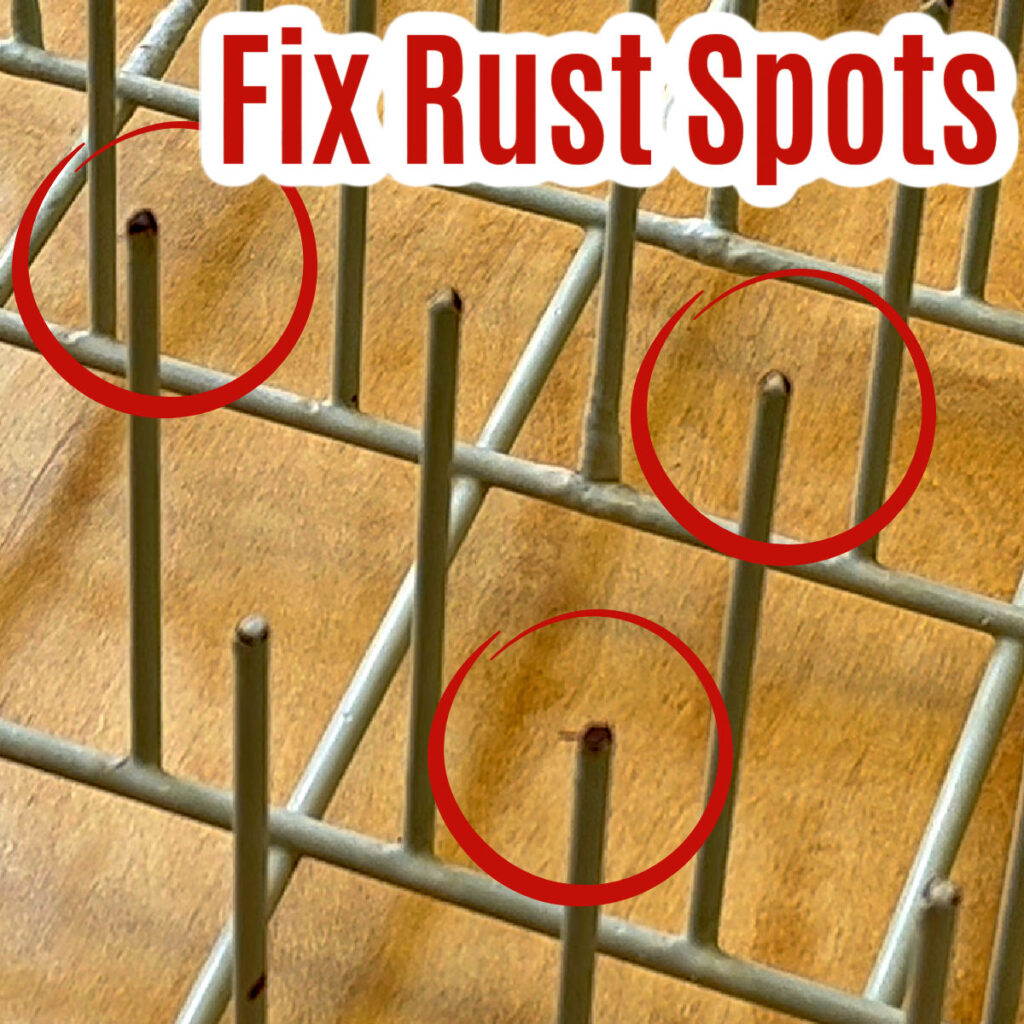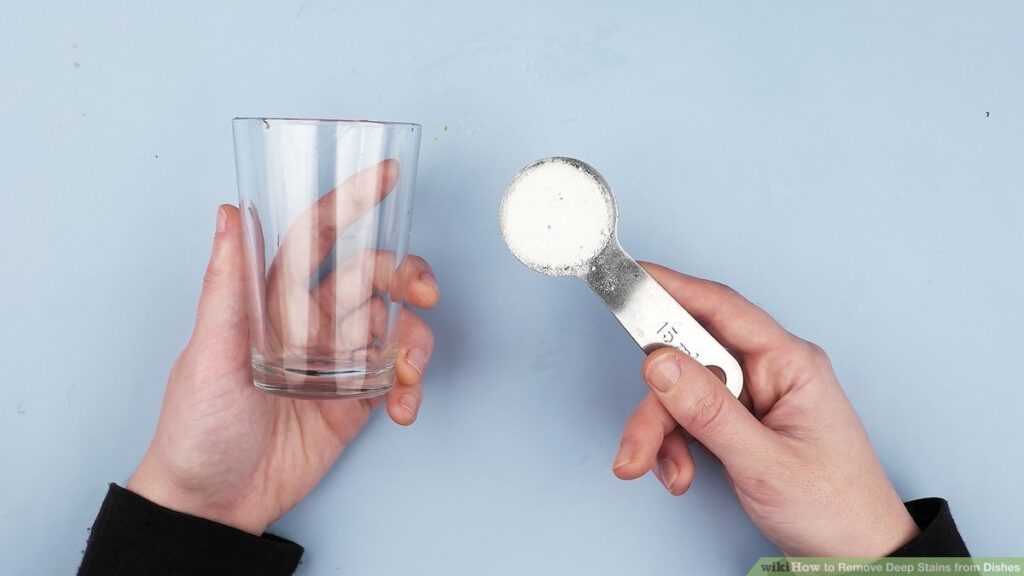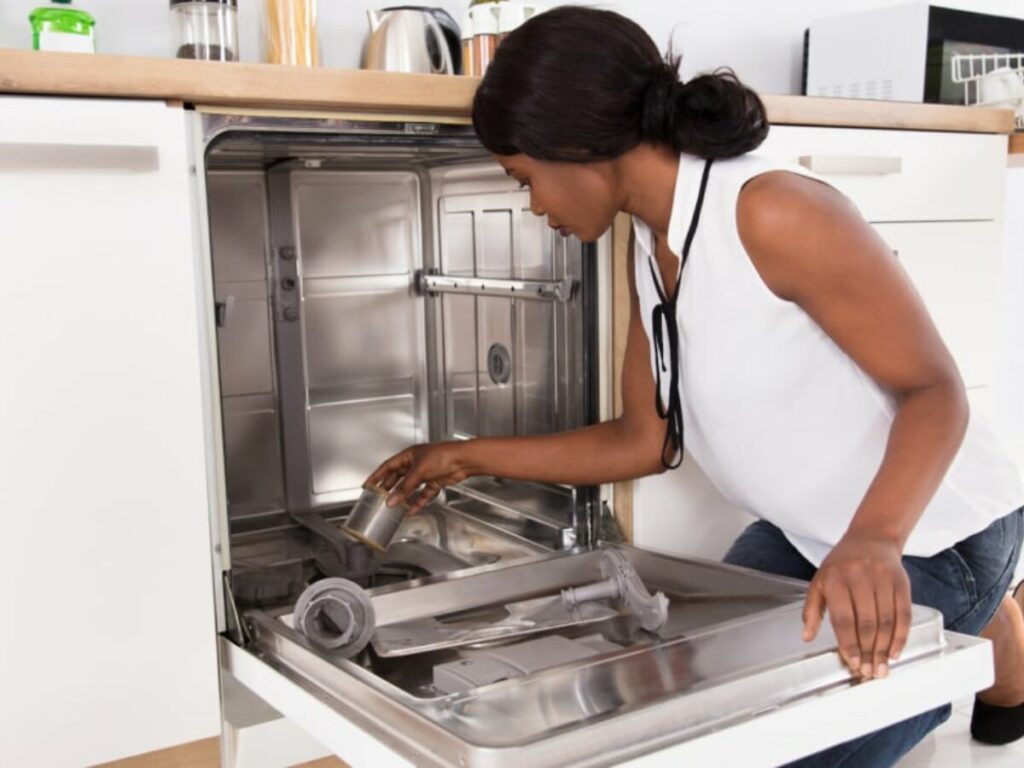
In this step-by-step guide, you will learn how to effectively tackle those pesky dishwasher rust stains that stubbornly cling to your dishes. We’ve all been there – you unload your clean dishes, only to be met with unsightly rust stains that mar their appearance. But fear not, because with a few simple techniques and supplies you already have at home, you can easily banish those rust stains and restore your dishes to their former glory. So let’s roll up our sleeves and get ready to bid farewell to those stubborn stains together!

This image is property of nwmaids.com.
Prevention is key
When it comes to dealing with dishwasher rust stains on dishes, prevention is key. By taking a few simple steps, you can minimize the chances of rust forming on your dishwasher racks and avoid the headache of having to remove those stubborn stains later on.
Check for rust on your dishwasher racks
It’s important to regularly inspect your dishwasher racks for any signs of rust. Rust can occur when the protective coating on the racks wears off, exposing the metal underneath. If you notice any rust spots, it’s crucial to address the issue as soon as possible to prevent further damage.
Avoid using abrasive cleaning tools
Abrasive cleaning tools, such as steel wool or harsh scrub brushes, can actually contribute to the formation of rust on your dishwasher racks. These tools can remove the protective coating and scratch the surface of the racks, making them more susceptible to rust. Instead, opt for softer materials like a soft cloth or sponge when cleaning your dishwasher racks.
Use a dish rack or drying mat instead of leaving dishes to air dry
Leaving wet dishes in your dishwasher for extended periods of time can lead to the formation of rust stains. Instead of allowing your dishes to air dry in the dishwasher, consider using a dish rack or drying mat. These alternatives allow air to circulate around the dishes and promote quicker drying, reducing the chances of rust forming.
Step 1: Gather the necessary supplies
Before tackling the rust stains on your dishes, it’s important to gather all the necessary supplies. Having these items on hand will make the cleaning process much easier and more efficient.
Gloves
To protect your hands from harsh chemicals or any sharp edges, it’s advisable to wear gloves while cleaning your dishes.
White vinegar
White vinegar is a versatile and effective cleaning agent that can help remove rust stains from your dishes. Its acidic nature helps to dissolve the rust, making it easier to scrub away.
Baking soda
Baking soda is another natural and effective cleaning agent that can be used to tackle rust stains. Its gentle abrasive properties can help scrub away the rust without causing any damage to your dishes.
Soft cloth or sponge
To scrub away the rust stains, you’ll need a soft cloth or sponge that won’t scratch or damage the surface of your dishes.
Toothbrush
A toothbrush can come in handy when cleaning hard-to-reach areas or smaller items, such as utensils or glassware.

This image is property of www.abbottsathome.com.
Step 2: Remove rust stains from dishes
Now that you have gathered all your supplies, it’s time to start removing those stubborn rust stains from your dishes. Follow these steps for effective rust stain removal.
Inspect the dishes
Before you begin, carefully inspect each dish for rust stains. Identify the areas that need special attention and focus your cleaning efforts on those spots.
Soak the dishes in vinegar
Fill a sink or a large container with equal parts water and white vinegar. Submerge the rust-stained dishes in the vinegar solution and let them soak for about 30 minutes to an hour. The acidic properties of the vinegar will help dissolve the rust and make it easier to remove.
Scrub the stains with baking soda
After soaking the dishes in vinegar, sprinkle some baking soda on a damp cloth or sponge. Gently scrub the rust stains using a circular motion. The baking soda will work as a gentle abrasive to help lift the rust stains off the surface of the dishes.
Rinse the dishes thoroughly
Once you have scrubbed away the rust stains, rinse the dishes thoroughly with clean water to remove any residue from the vinegar and baking soda.
Inspect and repeat if necessary
After rinsing, inspect the dishes one more time to ensure that all the rust stains have been successfully removed. If any stubborn stains remain, repeat the soaking and scrubbing process until the dishes are completely rust-free.
Step 3: Remove rust stains from dishwasher racks
In addition to removing rust stains from your dishes, it’s essential to address the rust on your dishwasher racks. Here’s how you can tackle the rust stains on your dishwasher racks effectively.
Remove the racks from the dishwasher
Start by removing the dishwasher racks from the dishwasher. Pay close attention to how they are positioned, as you will need to remember how to put them back in later.
Create a vinegar solution
Mix equal parts water and white vinegar in a container large enough to submerge the racks. This vinegar solution will help break down the rust stains on the racks.
Scrub the racks with the solution
Using a soft cloth or sponge soaked in the vinegar solution, gently scrub the racks to remove the rust stains. Pay extra attention to any heavily rusted areas. For smaller areas or hard-to-reach spots, you can use a toothbrush to scrub away the rust.
Rinse and dry the racks before placing them back in the dishwasher
After scrubbing the racks, rinse them thoroughly with clean water to remove any leftover vinegar solution. Once cleaned and rinsed, dry the racks completely before placing them back into the dishwasher. This will help prevent the formation of new rust stains.

This image is property of www.wikihow.com.
Step 4: Clean the dishwasher interior
To prevent rust stains from reoccurring, it’s crucial to clean the interior of your dishwasher regularly. Follow these steps to ensure that your dishwasher is rust-free and functioning optimally.
Empty the dishwasher
Before cleaning the interior, make sure that the dishwasher is empty of any dishes or utensils. This will allow you to thoroughly inspect and clean all areas of the dishwasher.
Inspect the interior for rust spots
Carefully examine the interior of your dishwasher for any signs of rust spots or stains. Pay close attention to areas that are exposed to water or have metal components.
Apply vinegar to rusted areas
If you spot any rust stains or spots, apply white vinegar directly to the affected areas. Let the vinegar sit for a few minutes to help break down the rust.
Scrub with a soft cloth or toothbrush
Using a soft cloth or toothbrush, gently scrub the rusted areas to remove the stains. Be careful not to scratch or damage any plastic or delicate components of the dishwasher.
Rinse the interior with water
After scrubbing, rinse the interior of the dishwasher with water to remove any vinegar residue or loosened rust particles. It’s important to remove all traces of vinegar to prevent any unpleasant odors during the next cycle.
Run a regular cycle without dishes
To ensure that the dishwasher is completely clean and free of any rust particles, run a regular cycle without any dishes. This will help flush out any remaining residue and ensure that your dishwasher is ready for use.
Step 5: Regular maintenance for rust prevention
Preventing rust from forming in your dishwasher is vital for maintaining its longevity and functionality. Implementing these regular maintenance practices can help keep your dishwasher rust-free.
Clean the dishwasher filter regularly
The filter in your dishwasher plays a crucial role in trapping food particles and preventing them from clogging the drain. Regularly cleaning the filter can help prevent the buildup of debris, which can contribute to rust formation. Consult your dishwasher’s manual for instructions on how to clean the filter properly.
Avoid using harsh dishwasher detergents
Some dishwasher detergents can be quite harsh and abrasive, which can strip away the protective coatings on your dishwasher racks. Opt for gentler and eco-friendly detergent options that are less likely to cause damage or contribute to rust formation.
Run vinegar or lemon juice cycles periodically
Running vinegar or lemon juice cycles periodically can help keep your dishwasher clean and prevent the formation of rust. Simply pour a cup of white vinegar or lemon juice into the bottom of an empty dishwasher and run a regular cycle. The acidity of these substances helps to remove any buildup and prevent rust.
Check for any signs of rust and take necessary action
Regularly inspect your dishwasher racks and interior for any signs of rust. Catching rust early can prevent it from spreading and causing further damage. If you notice any rust spots, take the necessary steps to address them promptly.

This image is property of buildingandinteriors.com.
Step 6: Seek professional help if necessary
In some cases, rust stains and issues with your dishwasher may require professional assistance. If you have tried all the above steps and the rust persists, it’s advisable to consult a professional repair service or the manufacturer for further guidance.
If rust persists, consult a professional
Professional repair technicians have the expertise and knowledge to deal with more severe cases of dishwasher rust. They can accurately diagnose the problem and provide the appropriate solution, whether it involves replacing parts or conducting repairs.
Consider replacing rusted dishwasher parts
If the rust stains are severe and have caused significant damage to your dishwasher, it may be necessary to replace rusted parts. Consult with a professional or the manufacturer to determine which parts need replacing and the best course of action.
Seek advice from the manufacturer or a repair technician
If you are unsure about how to address rust stains in your dishwasher or need specific guidance related to your dishwasher model, reach out to the manufacturer or a repair technician. They can provide expert advice tailored to your specific situation and help ensure that your dishwasher remains in optimal condition.
Conclusion
Rust stains on dishes can be a frustrating and unsightly problem. However, by implementing regular maintenance practices and taking preventive measures, you can keep your dishwasher rust-free and consistently provide stain-free dishes. Remember to check your dishwasher racks for rust, avoid using abrasive cleaning tools, and opt for dish racks or drying mats instead of leaving dishes to air dry. When removing rust stains from dishes, gather the necessary supplies such as gloves, white vinegar, baking soda, a soft cloth or sponge, and a toothbrush. Follow the step-by-step guide to remove rust stains from both the dishes and dishwasher racks. Clean the dishwasher interior regularly, run vinegar or lemon juice cycles periodically, and seek professional help if necessary. With a little care and attention, your dishwasher can continue to serve you well, free from rust stains.

This image is property of www.industrial-warewashers.com.





